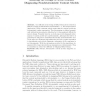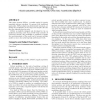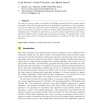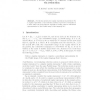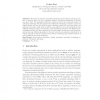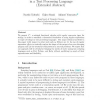128
Voted
IS
2011
14 years 9 months ago
2011
We consider the determinism checking of XML Schema content models, as required by the W3C Recommendation. We argue that currently applied solutions have flaws and make processors...
238
click to vote
APWEB
2011
Springer
14 years 9 months ago
2011
Springer
One difficulty in the design of XML Schema is the restriction that the content models should be deterministic, i. e., the Unique Particle Attribution (UPA) constraint, which means ...
129
click to vote
CCR
2010
14 years 11 months ago
2010
This paper presents iNFAnt, a parallel engine for regular expression pattern matching. In contrast with traditional approaches, iNFAnt adopts non-deterministic automata, allowing ...
113
click to vote
FSTTCS
2010
Springer
15 years 1 days ago
2010
Springer
We study the average number of transitions in Glushkov automata built from random regular expressions. This statistic highly depends on the probabilistic distribution set on the e...
118
click to vote
MFCS
2010
Springer
15 years 14 days ago
2010
Springer
A reduction system for regular expressions is presented. For a regular expression t, the reduction system is proved to terminate in a state where the most-reduced expression readil...
109
click to vote
JUCS
2010
15 years 14 days ago
2010
Abstract: We study the number of matching substrings in the pattern matching problem. In general, there can be a quadratic number of matching substrings in the size of a given text...
148
click to vote
ENTCS
2002
15 years 1 months ago
2002
d Abstract) Naoshi Tabuchi Eijiro Sumii Akinori Yonezawa 1 Department of Computer Science, Graduate School of Information Science and Technology, University of Tokyo We present re...
131
click to vote
ACTA
2000
15 years 1 months ago
2000
We show in this paper that parsing with regular expressions instead of context-free grammars, when it is possible, is desirable. We present efficient algorithms for performing diff...
121
click to vote
IJAC
2007
15 years 1 months ago
2007
There exist two well-known quotients of the position automaton of a regular expression. The first one, called the equation automaton, has first been introduced by Mirkin from th...
130
click to vote
JFP
2006
15 years 2 months ago
2006
XML data are described by types involving regular expressions. This raises the question of what language feature is convenient for manipulating such data. Previously, we have give...

